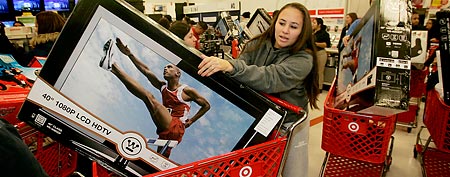Black Friday — the day after Thanksgiving that traditionally signals the beginning of the holiday shopping season because stores offer deep discounts that draw large, deal-hungry crowds — is just a couple of weeks away. Are you ready?
If you're a Black Friday pro who lines up outside stores every year before the crack of dawn(破晓) to nab(抢到) bargains, you're probably already planning your strategy — and we can help.
If you savor(尽情享受) your sleep and sanity, you're probably not even thinking about stepping in a store November 25. But keep in mind that you don't have to brave(不怕; 不顾; 勇敢地面对) the crowds to take advantage of Black Friday sales.
These Black Friday do's and don'ts will help you score the best deals — whether you want to shop from home in your pajamas or venture out to the stores (perhaps in something other than PJs).
DON'T rely solely on leaked ads to plan your Black Friday strategy. Plenty of Web sites specialize in publishing Black Friday ads before they appear on retailers' Web sites or in newspapers. You can use these leaked ads as a starting point for planning your purchases, but realize that you're reading gossip, says Dan de Grandpre, CEO of dealnews.com, one of our favorite deal sites. Inevitably, some of the information in leaked ads is wrong, he says. Most legitimate ads aren't published until the Sunday before Black Friday.
DO expect some Black Friday sales to start on Thursday. Many retailers will start offering discounts online on Thanksgiving day. And some, such as Amazon, will offer Black Friday deals several days before November 25 — so hot items may sell out before the big shopping day after Thanksgiving.
DON'T assume the best deals are in the stores. It's a tradition for a lot of people to get up at the crack of dawn and camp out in front of stores to scoop up deals. But de Grandpre says a lot of doorbusters(开门大抢购) (those deeply discounted items retailers use to get consumers in the door early Friday) will be available online, too — especially on big-ticket(高价的) products. And if an Apple product is on your gift list, you'll probably find it for less online (at Amazon.com, MacMall.com or McConnection.com) than at an Apple store — and you may escape sales tax on your purchase.
DO brave the crowds if you're trying to snag(抓住) an extremely limited item. You have a better chance of getting the deal if you go to the store — and are first in line. Keep in mind, though, that items that are marked down dramatically are cheap items to being with — not top-selling, name-brand products, de Grandpre says.
DON'T do all your holiday shopping on Black Friday. Consider the Friday after Thanksgiving as one of several days to find deals. The best deals on apparel usually appear on Cyber Monday (November 28 this year), when retailers discount items online. Toys will be cheaper the first two weeks of December when Walmart and Amazon go to war with each other to offer the lowest prices and clear out inventory before Christmas, de Grandpre says. And the best deals on name-brand TVs and luxury items can be found in early December, too.
DO check return policies. Some retailers tighten their policies around the holidays. Some charge restocking fees if you bring an item back. And some won't let you exchange items that were manufactured specifically for Black Friday (to be sold at a low price). So be sure to ask each store what its policy is, and hang on to your receipts.
DON'T spring for extended warranties on big-ticket items. There's a good chance that a salesperson will try to talk you into paying extra for an extended warranty(延长产品保修期的服务) if you purchase a big-ticket item on Black Friday. That's because revenue from extended warranties helps make up for lost profits on discounted items. Typically, you'll pay 10% to 20% more for an item to extend a one-year manufacturer's warranty through the fifth year of ownership. But most major appliances do not break down within the extended-warranty period. Plus, you might already be covered if you use your credit card to purchase an item.
AND FINALLY... DON'T wait until the week before Christmas to shop. Retailers often raise prices because supplies are limited and they know that last-minute shoppers will pay more to purchase all the items on their gift lists.


